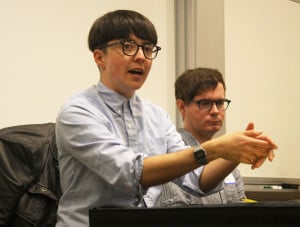Campus participation in Stanford’s 2012 Transgender Awareness Week has far exceeded expectations, according to members of Stanford Students for Queer Liberation (SSQL), which was the primary organizer of the event.
“We were expecting maybe six or seven people to show up,” said Leanna Keyes ‘14, an SSQL member who helped plan the week, of Monday’s first event. “But when I got there, 60 or 70 people were there at the same time–standing room only. We were way over capacity. It was amazing.”
Alok Vaid-Menon ‘13, a member of the SSQL steering committee for the event, who has now participated in three Transgender Awareness Weeks, said that this year “had bigger turnout than we’ve ever seen.”

“Every event has been consistently attended,” he said.
The Feminist Studies and Comparative Studies in Race and Ethnicity programs were also heavily involved in planning the week’s events. In total, more than fifteen University and student organizations sponsored the event, including the Clayman Institute for Gender Research and an ASSU Executive Action Grant.
Contextualizing the week
According to Vaid-Menon, this year’s theme “Beyond Binaries,” was designed to address topics that are not usually covered in mainstream conversations, such as the binaries between sexuality and asexuality, as well as monogamy and polyamory.
“We tend to perceive the world as ‘There’s only man and only woman, there’s only gay people, there’s straight people,’” Vaid-Menon said. “We wanted people not just to learn about trans issues, but also to think critically about their own identities and the way that our own culture perpetuates these binaries without allowing more complex narratives.”
Vaid-Menon said that SSQL’s decision to hold the week during spring quarter, as opposed to winter quarter like last year, was logistical.
“We didn’t want to jam pack it into all the other events going on,” Vaid-Menon said. “We wanted to do it at the beginning of the quarter, so people could learn from these issues and be inspired, and actually act on them. So we hope that people who were affected by the events this week will feel galvanized.”
Sibel Sayiner ‘15 said that in her first year helping organize the event, she thought SSQL succeeded in identifying diverse topics that were attractive to the student body.
“Planning went relatively well and smoothly,” Sayiner said. “We had a few hijinks about exactly which issues we wanted to address and how best to present those issues so that a general public would engage with them and find them interesting and therefore be motivated to attend events.”
“We thought pretty critically about that,” Sayiner added.
Sayiner said that while she expected focus on ASSU elections to dominate campus attention this week, attendance also surpassed her expectations.
Looking forward
SSQL does not have any additional trans issues events coming up, but Vaid-Menon stressed that the concerns of the transgender community are a high priority for the group.
“It’s always important to establish that SSQL takes trans organizing and trans issues as central to our organization,” Vaid-Menon said. “We define ourselves against mainstream LGBT organizations that have trans issues on the side.”
Keyes commented that she doesn’t think conversations about trans issues are happening much on campus.
“I don’t think that there is a lot of campus dialogue at the moment,” she said. “But I don’t think that people are necessarily going to express their full range of opinions when a transgender person is around–that doesn’t necessarily mean that things are bad.”
Keyes noted that there has not been a hot button issue around trans rights–such as last year’s ROTC debates and protests–which may account for the decreased general attention.
In terms of improving dialogue, Keyes said that more active student interest and participation in panels like Safe and Open Spaces at Stanford (SOSAS) could be beneficial.
“SOSAS makes a concerted effort to make sure that a wide variety of voices are represented on campus–particularly trans voices,” Keyes said. “The dialogue that comes out of those panels is incredibly important to making sure that everyone feels safe and is informed at Stanford.”
Keyes added that peer health educators (PHEs) providing incentives for attending SOSAS panels and students doing personal outreach to friends would likely improve awareness.
SOSAS panel attendance currently “does not always meet expectations,” Keyes said.
Vaid-Menon noted that he hopes students who are interested will come to SSQL meetings, adding that there is no requirement of literacy in queer issues.
He also commented that students tend to view this week, and others sponsored by the LGBT community, as for members of the queer community only. He said he wanted to challenge this notion.
“The way this week and others get constructed are as being just for the LGBT community, but we have events to allow people to reflect on their own identities themselves,” he said. “We want to emphasize that we all have genders and we all have sexualities.”